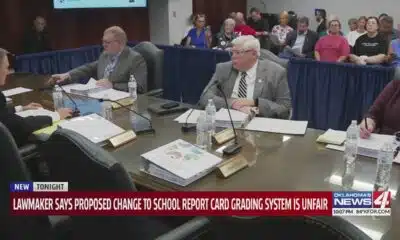News from the South - North Carolina News Feed
After 2024’s lies, is there a future for truth? Jimmy Carter would have answered “Yes” • Asheville Watchdog
“If you tell a lie big enough and keep repeating it, people will eventually come to believe it.”
– Joseph Goebbels, January 12, 1941
If I were to write a headline over a story summarizing the essence of the 2024 elections, it would be this: the year of the new Big Lie.
You’d think by now that my generation would be inured to deceit, exaggerations, cheating and false claims from those in high office. We came of age when President Lyndon Johnson cooked up the Tonkin Gulf incident to pull this country and many of us into the Vietnam War.
Richard Nixon brought us Watergate and his ironic line “I am not a crook,” which he was. Dick Cheney convinced George W. Bush that Saddam Hussein was hiding weapons of mass destruction in Iraq, justifying that invasion and a decade of war costing tens of thousands of lives. None was found.
Yet the unending eruption of lies flooding the political discourse throughout 2024 exceeded anything I have seen in my 52 years of covering campaigns from school boards to the White House.
Deceit touched the top of both major tickets. The Democratic Party leadership engaged in a conspiracy of silence, pretending that its incumbent 82-year-old standard-bearer retained his full faculties despite what our eyes were seeing. After Joe Biden finally faced reality and stepped aside, he shattered the faith of many admirers — not to mention his legacy — by extending a presidential pardon to his son despite numerous pledges never to interfere with the justice system. He had lied.
The scale of falsehood on the Democratic side was more than counter balanced by even a partial list from the Republican side.
It included such cruel fallacies as pet-eating Haitian refugees; the Big Lie that the 2020 election was stolen from Donald Trump; his claim that the leaders of the January 6 attack on the Capitol were patriots, not insurrectionists; and his claim during a post-Helene stop in Swannanoa that FEMA was broke because it was spending public money on illegal refugees.
The list goes on, though I won’t.
What matters is that we don’t paper over what happened and ignore the central question dominating the 2024 campaign.
It’s this: Do truth and personal integrity matter in politics anymore? Do we no longer care when politicians and office holders lie to us, even when we know they’re lying and they know we know?
Was 2024 the dawn – or the approaching dark – of the new normal?
Throughout history many powerful people have lied for political gain. But never in my journalism career has perpetual lying carried no penalty when caught.
Richard Nixon paid a penalty in 1973, forced to resign though he had won a landslide reelection a year before. In being vanquished, Nixon perp-walked out of the White House months after his bribe-taking vice president, Spiro Agnew.
Disgusted voters punished Nixon’s successor Gerald Ford because he spared Nixon from criminal prosecution by pardoning him.

Instead, in 1976 we elected a peanut farmer and ex-Navy nuclear submariner named Jimmy Carter who rose from relative obscurity in Georgia. The media had dubbed him “Jimmy Who?”
But voters rallied to Carter’s unpretentious ways (when traveling he carried his own suitcase and preferred staying with supporters, always making the bed) and his single-sentence campaign promise: “I will never lie to you.”
Carter, who died Sunday at age 100, was a teetotaling Sunday school teacher and behaved as one. He married his high-school sweetheart Rosalynn, and throughout their lives treated her as a full partner. Even many friends found him sanctimonious, others thought him endearingly “weird.” No one could brand him as a hypocrite.
When a Playboy magazine interviewer implied that Carter was such a prude he might lose the votes of less abstemious men, he insisted he had moral flaws: “Many times I have committed lust in my heart.”
I believe that remembering Carter is relevant to us in 2024. His success after the Watergate scandal offers the hope that a reckoning will come to those who pursue Goebbels’s “lie-big-and-often” playbook. The Nazi propagandist warned, “Truth is the mortal enemy of the lie,” and thus to the liar.
Voters, of course, want more than truth-telling, which should be expected for all candidates. Although Carter’s moral compass was true, he could be politically inept.
I learned this from being assigned to cover Carter’s two presidential campaigns and his four years in the White House.
Although his single term ended in a landslide defeat to Ronald Reagan, historians in retrospect give it high marks for substance and decency, if not for style.
It was Carter who made human rights a central pillar of U.S. foreign policy. He is the only president to have ended a war in the Middle East. His Camp David accords in 1978 established enduring peace between Egypt and Israel and led to a Nobel Peace Prize.
He won allies and friends throughout Latin America by turning over U.S. control of the Panama Canal to Panamanians, ending a vestige of American imperialism – a vestige Donald Trump says he wants to bring back. Carter’s concern for the environment and additions to the nation’s natural treasures matched those of Theodore Roosevelt, father of the national parks.
But his reelection in 1980 was doomed by runaway inflation driven largely by an unprecedented Arab oil embargo, and the failure to rescue American diplomats held in humiliating captivity for 444 days by Iranian revolutionaries.
Carter seemed hapless in contrast to Reagan, his Republican opponent. The California governor and ex-movie star exuded swaggering confidence in promising to “make America great again,” a slogan adopted 36 years later by Trump.
Although his presidency ended in defeat, Carter wasn’t defeated.
His post-presidency’s achievements through The Carter Center far exceed those of any previous president and set a standard for statesmanship that may never be matched. To list a few: The Carter Center’s many invitations to oversee free and fair elections in troubled democracies is respected across the globe. It is credited with leading the eradication of many diseases afflicting millions in impoverished countries. His popularization of Habitat for Humanity, including his own hammer-wielding work, has helped countless thousands of people move into their own homes.
The common thread through all this is missing from our national fabric and many of our elected leaders: integrity in all things.
We deceive ourselves if we think that we can be a “great again” nation and yet tolerate lies and fear truth. This was a lesson learned too late by the “good Germans” nearly a century ago ensnared in Goebbels’s tactics.
Carter celebrated his 100th birthday in October and was by far the longest-living former president. After leaving the White House in 1981, he and Rosalynn returned to their two-bedroom house adjoining the peanut farm in Plains.
That’s where he died Sunday after spending his final months in hospice care in delicate condition.
Like our democracy.
Asheville Watchdog is a nonprofit news team producing stories that matter to Asheville and Buncombe County. Tom Fiedler is a Pulitzer Prize-winning political reporter and dean emeritus from Boston University who lives in Asheville. Email him at tfiedler@avlwatchdog.org. The Watchdog’s reporting is made possible by donations from the community. To show your support for this vital public service go to avlwatchdog.org/support-our-publication/.
Related
The post After 2024’s lies, is there a future for truth? Jimmy Carter would have answered “Yes” • Asheville Watchdog appeared first on avlwatchdog.org
News from the South - North Carolina News Feed
‘Highballed’: Data shows tax assessment inequalities affecting longtime homeowners
SUMMARY: Longtime homeowners in historically Black neighborhoods like Hillsborough face disproportionate property tax burdens compared to wealthier, mostly white areas nearby. Beverly Walton, a 66-year resident of Renshaw Street, inherited her home but struggles to afford rising taxes despite no renovations. Her house, valued lower than newer homes, is taxed at a higher rate, leading to financial strain on fixed incomes. Data from Wake, Durham, and Orange counties reveal majority nonwhite neighborhoods pay about $9 more per $100,000 in home value, despite lower average home prices. Advocates call for fairer assessments to prevent pricing out longtime residents amid regional growth.
Data shows tax assessment inequalities affecting longtime homeowners
https://abc11.com/post/highballed-data-shows-tax-assessment-inequalities-affecting-longtime-homeowners/17473973/
Download: https://abc11.com/apps/
Like us on Facebook: https://www.facebook.com/ABC11/
Instagram: https://www.instagram.com/abc11_wtvd/
Threads: https://www.threads.net/@abc11_wtvd
TIKTOK: https://www.tiktok.com/@abc11_eyewitnessnews
News from the South - North Carolina News Feed
Two deaths, sinkholes, downed trees: The impacts of severe flooding in Triangle
SUMMARY: Severe flooding in the Triangle region has caused two deaths, sinkholes, and downed trees. In Nash County, 55-year-old Raymond Evans Jr. and 24-year-old Lahie Alustin died after their minivan was swept into a ravine. Evans heroically tried to save Alustin after police efforts failed. A memorial has grown at the site. In Apex, heavy rain caused a sinkhole on Olive Chapel Road, collapsing a section already slated for repairs. Town officials are working with the Department of Transportation to expedite repairs, possibly earlier than the initially expected November timeline. Residents face detours and ongoing disruptions.
WRAL is tracking the impact of severe flooding that occurred all through Wednesday. Rain will continue on-and-off on Thursday, and it could be heavy at times.
News from the South - North Carolina News Feed
Family desperate for answers after NC 18-year-old disappears in FL
SUMMARY: Giovanni Pelletier, an 18-year-old from Fuquay-Varina, NC, disappeared nearly a week ago in Florida after meeting his biological dad’s family. During a family trip, Giovanni was last seen around 1:30 AM when his cousins picked him up, but he was later reported left on the side of the road following an alleged altercation. His backpack and phone were found by a truck driver. His family is desperate for answers, struggling with conflicting information from his cousins. Giovanni recently graduated high school, and his parents are continuing the search, offering a $25,000 reward for information, with help from Florida authorities.
“Somewhere along the ride, something happened.”
More: https://abc11.com/post/giovanni-pelletier-family-searching-north-carolina-18-year-old-went-missing-traveling-florida/17457613/
Download: https://abc11.com/apps/
Like us on Facebook: https://www.facebook.com/ABC11/
Instagram: https://www.instagram.com/abc11_wtvd/
Threads: https://www.threads.net/@abc11_wtvd
TIKTOK: https://www.tiktok.com/@abc11_eyewitnessnews
-
Mississippi Today5 days ago
After 30 years in prison, Mississippi woman dies from cancer she says was preventable
-
News from the South - Georgia News Feed6 days ago
Woman charged after boy in state’s custody dies in hot car
-
News from the South - Florida News Feed5 days ago
Warning for social media shoppers after $22K RV scam
-
News from the South - Texas News Feed6 days ago
Texas VFW holds memorial service for WWII pilot from Georgetown
-
News from the South - North Carolina News Feed3 days ago
Two people unaccounted for in Spring Lake after flash flooding
-
News from the South - Georgia News Feed5 days ago
Georgia lawmakers to return this winter to Capitol chambers refreshed with 19th Century details
-
News from the South - Alabama News Feed6 days ago
Flood Watch for Alabama: Storms linger overnight, with cooler weather in the forecast
-
News from the South - Missouri News Feed7 days ago
Missouri native Chad Marler takes title, wins $100K at major bass tournament











































